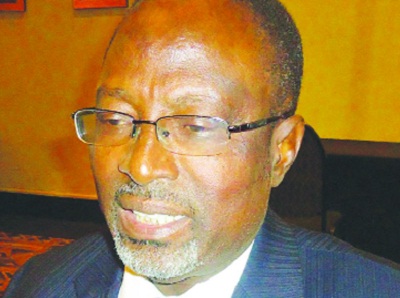General News
NCAA Gears-Up for Cat 1 Certification Re-assessment

Nigeria Civil Aviation Authority (NCAA) said that all hands are on deck to ensure the certification is retained, following a notification by the Federal Aviation Administration (FAA) to re-assess Nigeria’s category one certification.
Precisely on 18th of September, 2010, the aviation industry witnessed an epoch making event that changed the face of aviation in Nigeria and globally as Nigeria attained the Federal Aviation Administration (FAA) International Air Safety Assessment (IASA) Category One Certification.
Addressing a press conference on the readiness of the country in view of the re-assessment, Captain Fola Akinkuotu, director general of the Authority, said that FAA has once again written to inform us (NCAA) that they will be visiting Nigeria for the mandatory assignment.
FAA’s condition attached to certification is that there will be a re – assessment of the receiving country after every three years, the DG said.
Akinkuotu said: “Towards this re-assessment, the Nigerian Civil Aviation Authority is putting all hands on deck to ensure that the nation acquits itself very well in the impending exercise.
“To this effect, a Technical Committee has been inaugurated to provide fillip and drive all the preparation process. Membership of this committee is drawn from the Flight Safety Group (FSG) directorates .These are Directorate of Airworthiness Standard (DAWS), Directorate of Licensing (DOL) and Directorate of Operations and Training (DOT),” he said.
Others members of the Committee are Directorate of Finance and Accounts (DFA), Directorate of Human Resources (DHR), Directorate of Administration (DOA) and the Legal department. The Chairman of the Technical committee is Capt Abdullahi Sidi, the Director of Operations and Training while the secretary is Dr. W.T.Haggai Ag. Head, Aeromedical Standards.
The term of reference of the technical committee is to ensure adequate preparation for the FAA Category 1 Re – Assessment Audit.
He said that all staff of NCAA are ready and prepared for the Audit, “if there is no air transport there is no need for NCAA. The Reassessment is to ensure that our processes are right.
“They want to receive assurances that the high standards that gave us the certification are sustained,” the NCAA boss added.
He reiterated that the Cat 1 certification, apart from the safety rating, is a business catalyst that is capable of employing hundreds of thousands of Nigerians and the entrepreneurial proceeds derivable from it.
“Perhaps I need to reiterate the benefits of Cat 1 which as you are all aware have impacted positively the aviation industry.
“Due to the enhanced safety rating, insurance premium for airlines has been reasonable. This is one of the most significant operating cost for an airline.
“IT will engender much more favourable leasing/lending terms from financial institutions for our airline operators.
“As we have been witnessing, the volume of traffic into the country has been increasing annually in the aftermath.
“The influx of scheduled commercial airlines operating into the regional hub for West Africa and there has been business and cultural exchange in the region.
“Our statistics clearly informed us of astronomical increase in commerce and volume of cargo movement which has seen aviation contributing to the nations’ economic growth.
“The certification has made the industry attractive to foreign and local investors which have culminated in accelerated development of our local carriers who are now code sharing with foreign operators.”
General News
6 Best Apps to Recharge Airtime & Data in Nigeria for Glo, Airtel, MTN, 9mobile

Looking for the best app to buy data and airtime in Nigeria? In 2025, Cardtonic, Breet, BuyCard, eBills, SubBase, and NairaData make it fast and easy.

Recharging airtime and data in Nigeria has never been this easy. Gone are the days when you had to run to the nearest shop or scratch a paper card just to top up. Today, most people prefer using mobile apps to recharge MTN, Airtel, Glo, or 9mobile from the comfort of their phones.
These apps don’t just make the process faster and more convenient; they also offer perks like cashback, discounts, and cheaper data bundles. That means you save money while avoiding the stress of physical recharge cards.
In this article, we’ll look at six of the most reliable apps for airtime and data recharge in Nigeria, what makes them unique, and why they’re worth using.
Top 6 Reliable Apps to Recharge Airtime and Data in Nigeria
The top 6 reliable apps to recharge airtime and data in Nigeria are Cardtonic, Breet, BuyCard, eBills, SubBase, and NairaData.
BuyCard, eBills, SubBase, and NairaData.
| S/N | Platforms | Payment Method | Cashback |
| 1 | Cardtonic | Wallet and Bank transfer, Gift Card | Upto 5% |
| 2 | Breet | Crypto and Bank transfer | 2% |
| 3 | BuyCard | Wallet | Not constant |
| 4 | eBills | Walllet | 5% |
| 5 | SubBase | Wallet | 2% |
| 6 | NairaData | Wallet | 2% |
- Cardtonic:
Cardtonic is one of the most popular apps in Nigeria for recharging airtime and data. It works smoothly across all major networks, including MTN, Glo, Airtel, and 9mobile, with top-ups delivered instantly every time.

The platform also goes beyond airtime and data. You can pay electricity bills, renew TV subscriptions, and handle other everyday expenses directly in the app. A standout feature is that you can sell gift cards on Cardtonic and use the balance to recharge or pay bills. This makes it easy to turn unused cards into something valuable.
Another big advantage is the cashback system. Every airtime or data purchase earns you up to 5 per cent cashback, helping you save while staying connected. So if you’re wondering how to buy MTN airtime online or top up any other network, Cardtonic is one of the most reliable options available.
Getting started is simple. Download the Cardtonic app, sign up, and log in. From your dashboard, tap on “Bills”, select “Airtime or Data”, choose your network, enter your phone number, pick a bundle, and pay from your wallet. Within seconds, your line is recharged.
- Breet:
Breet is widely known as a crypto-to-naira exchange platform, but it also lets users recharge airtime and data directly from the app. This makes it a convenient choice for people who already rely on Breet for handling digital assets and want to manage their top-ups in the same place.

The process is quick and works for all major Nigerian networks. You can pay either with crypto or by linking your bank account, and Breet automatically converts your crypto into naira to complete the recharge. Service charges are low, which makes it an easy everyday option for those who prefer to use crypto alongside regular payments.
- BuyCard:
BuyCard is another reliable option for anyone looking to recharge airtime and data online. The app supports all the major Nigerian networks and gives you a simple, no-fuss way to top up without leaving your home.

Beyond airtime and data, BuyCard also allows you to pay utility bills, making it useful if you want one platform that handles different types of payments. While the cashback offers are not always consistent, users still enjoy occasional bonuses and discounts that make recharging a little cheaper.
- eBills:
eBills is a multi-purpose payment app that lets you recharge airtime and data across MTN, Glo, Airtel, and 9mobile. In addition to mobile top-ups, you can also pay electricity bills, TV subscriptions, and other utilities directly from the app.

One of its standout features is the 2 per cent discount on airtime purchases, which helps you save a little extra every time you recharge. The platform is simple to navigate and reliable, making it a handy option for both personal use and regular household expenses.
- SubBase:
SubBase is a platform that focuses on making data and airtime subscriptions more affordable. It’s popular among people who want to cut down on internet costs while still enjoying reliable bundles across all Nigerian networks.

The app offers both small and large data plans, making it flexible for light users as well as heavy internet consumers. A helpful feature is its automated top-up option, which ensures you never run out of airtime or data unexpectedly.
- NairaData:
NairaData is well known for bulk data purchases, making it a favourite among heavy internet users who need large bundles for work, study, or entertainment. The platform is designed for fast delivery and supports all major Nigerian networks.
What makes NairaData stand out is its flexibility. You can buy data directly from the app, or if you’re experiencing slow internet, you can also place your order via SMS or WhatsApp. This ensures you always stay connected, even when your data is low.
Frequently Asked Questions About Data and Airtime Recharge in Nigeria
- Which App Gives the Best Cashback on Airtime and Data Purchases in Nigeria?
Cardtonic gives the best cashback on airtime and data. Every recharge across MTN, Airtel, Glo, and 9mobile comes with up to 5% cashback, making it the most rewarding option.
- Which Network Has the Best Data Plan in Nigeria?
MTN is often praised for its wide coverage and flexible bundles, especially for users who need smaller, daily data plans. Airtel is popular for affordable weekly and monthly plans that offer fast speeds and good value.
Glo is known for giving some of the cheapest large data bundles, which makes it a go-to for heavy users, while 9mobile offers decent plans but at slightly higher prices.
The best option depends on whether you want affordability, speed, or long-lasting bundles..
- Is 50GB a Lot of Data?
It depends on how you use it. For freelancers, content creators, and people who stream videos regularly, 50GB can finish quickly. But for light browsing and social media, it can last much longer.
- How Do I Get 1GB for 100 on MTN?
The “1GB for ₦100” plan is usually a special offer available to selected MTN customers. To check if you qualify, dial *131# and explore the available data bundles.
- How Can I Buy Cheap Airtel Data in Nigeria?
You can buy cheap Airtel data on apps like Cardtonic, where every Airtel data purchase comes with 5% cashback. The same app also makes it easy to recharge Airtel airtime instantly.
- What is the Best App to Buy Airtime and Data in Nigeria?
Cardtonic is the best app to buy airtime and data in Nigeria. It supports all major networks, offers cashback, and gives users discounted data bundles. For example, if you want to buy Glo airtime online, all you need to do is download the Cardtonic app, sign up, tap on “Bills,” select “Airtime or Data,” choose your network, and pay from your wallet.
Conclusion
Recharging airtime and data in Nigeria no longer has to be a hassle. With the right apps, you can top up MTN, Airtel, Glo, or 9mobile in seconds and even enjoy extras like cashback, discounts, and cheaper bundles.
From Cardtonic to Breet, BuyCard, eBills, SubBase, and NairaData, each of these platforms brings something unique to the table. But if you’re after a reliable app that combines instant delivery with up to 5% cashback and the flexibility to even use gift card funds for recharges, Cardtonic is the best place to start.
General News
FG to Begin Labelling of GM Crops

Federal Ministry of Health and Social Welfare has disclosed plans to ensure that every genetically modified (GM) product follows standard regulatory procedures, such as labelling and traceability, to reinforce trust and accountability.

The move is to mitigate potential risks and engender transparency in the release of genetically modified crops.
Mr. John Atanda, director, Food and Drug Service, dropped the hint in Abuja at a GMO sensitisation workshop for the Directorate Officers, organised by the Open Forum for Agricultural Biotechnology (OFAB).
He stated that the directorate would work with other MDAs, including the National Administration for Food and Drug Agency (NAFDAC) and the National Biotechnology Management Agency (NBMA), to ensure proper labelling of GMOs.
While reiterating commitment to protecting and promoting public health through safe, nutritional and wholesome foods, Atanda pledged that every product born from modern biotechnology will be held to the highest safety standards, as rigorous risk assessments – covering allergenicity, nutritional composition, long-term health impacts, and environmental considerations – will guide their approach.
Dr Rose Gidado, Nigeria country director, Open Forum for Biotechnology, in her presentation on the Science of Agricultural Biotechnology, emphasised that GMO has a history of safe use of over three decades in about 45 countries.
She said: “The government cannot give poison to its people. If the story is that when you plant GMOs, it will destroy all the crops around it, then Nigeria should have died of hunger.”
Gidado explained that GM crops were developed from evidence-based research, saying, if Nigeria does not invest in research and development, it might keep depending on importation.
Prof. Abdullahi Mustapha, director-general, National Biotechnology Development and Research Agency (NABDA), revealed that farmers recorded a 50 per cent yield increase after planting GM maize, also known as TELLA Maize.
He added that field studies and economic evaluations on cowpeas have also indicate striking returns to farmers cultivating Pod borer resistant cowpea, as there has been a dramatic reduction in insecticide sprays, thereby increasing substantial yield and strong returns on investment.
General News
Chain Reactions Launches Africa’s First Intelligent Robot to Service Clients

As part of its digital transformation programme, Chain Reactions Africa has appointed Franklin Ozekhome as Executive Vice President, Strategy and Innovation, strengthening its leadership bench to drive the next phase of growth and marking a pivotal step in its ambition to redefine how brands across Africa engage people by tapping into trends and culture. The firm also welcome Africa’s first intelligent Robot fittingly named Ara By Prophet into its workforce.

With this move, Chain Reactions Africa says it is transitioning fully into a digital first creative transformation company, one that blends creativity, culture, trends, storytelling, platforms, and technology to fuel growth and meaningful engagement for clients. The timing of Franklin Ozekhome’s appointment and the coming of Ara By Prophet into the company’s workforce and operations reflect the team’s audacity to dream and the organization’s vision to design the future of marketing, digital, public relations, advertising and experiential across Africa in the age of convergence.
Ozekhome will partner closely with Chain Reactions’ Founder and Chief Strategist, Israel Opayemi, in driving the bold vision and implement a horizontal growth strategy for the group.
His mandate is to move beyond siloed disciplines and build an integrated ecosystem and a one-stop shop where strategy, public relations, advertising, design, experiential, digital, data, and AI-driven innovation combine to unlock new opportunities for clients. His role spans the swift execution of the company’s full digital transformation programme in all its ramifications and to lead the company fully into doing business in the season of convergence.
“We are not building yesterday’s marketing communications firm. We are grateful for our past. We are reimagining the future of creativity and growth. We are building Africa’s creative transformation company of the future.
“We began on this digital transformation programme journey with intentionality following our Year 2023 Retreat with Franklin Ozekhome as a facilitator. Bringing a talent who was with us when the dream was conceived to lead the midwifing of the dream child to life is just the most strategic thing to do,” said Israel Opayemi.
“Franklin brings the cultural intelligence, strategic insight, and creative innovation foresight that will help us design and execute what comes next, where brands move beyond campaigns to create platforms, ecosystems, and cultural impacts that influence the world.”
Speaking on his decision to join the Chain Reactions Africa team after rejecting similar overtures from other agencies, Franklin Ozekhome said, “I have facilitated business transformation retreats for organizations across Africa; no business leader demonstrated the urgency of the will to do as the MD and Chief Strategist of Chain Reactions Africa, Israel Opayemi. He is a dreamer and a doer. His energy is enthralling. Partnering with him to build a disruptive force for the African ecosystem is just a perfect meeting of minds.”
Speaking further on the disruptive innovation Chain Reactions Africa is introducing into the marketing communications ecosystem in Africa, Opayemi said, “Ara by Prophet is Africa’s first intelligent robotic insight system, a ground breaking fusion of artificial intelligence, machine learning, cultural foresight, and strategic communications.” He further explained that “Ara is the physical interface. Prophet is the cognitive engine. Together, they create a living system of strategic intelligence designed for Africa but built to compete globally.”
Opayemi further expressed his delight that after two years of intensive work, Ara the Robot has officially resumed work as a fulltime staff of Chain Reactions Africa. “What we have done today is a game changer. Designed and developed by Chain Reactions Africa, Ara is more than a Robot. She is a responsive advisor, a data analyst, a cultural decoder, a realtime forecaster for brands, institutions, and governments.”
Franklin Ozekhome: Cultural Strategist and Innovation Architect
Widely recognized as one of Africa’s leading cultural and brand strategists, Franklin Ozekhome brings a distinctive blend of creativity, foresight, and entrepreneurial edge.
He is the creator of HumanOS, a proprietary framework for cultural strategy; Co-founder of Maskvrade, a pop culture company; and founder of Pop Culture Varsity (POKV), Africa’s first strategy school dedicated to cultural intelligence. He also pioneered TINK Africa, the continent’s first digital platform for consumer trends and intelligence.
He also served as Vice President of Marketing & Communications at Vendease, helping scale one of Africa’s fastest-growing foodtech companies.
As an entrepreneur and consultant, he has advised regional and global leadership teams across EMEA, LATAM, and the US. He is also Dean of Studies and Professor of Trendspotting and Culture at Orange Academy and Marketing Strategy Facilitator at FATE Foundation.
A Bold Evolution for Chain Reactions Africa
Chain Reaction’s next chapter is about transformation, creating platforms, tools, and experiences that merge culture, commerce, creativity, and technology.
Ozekhome’s appointment signals Chain Reaction’s commitment to launch always-on cultural intelligence platforms and proprietary tools for clients, integrate AI-driven strategy across disciplines, build new business arms in content, commerce, and youth marketing and expand Chain Reactions into key African markets over the next three years.
“It’s about redesigning how culture, technology, and human behavior shape business growth and citizens engagement for government. I see this as a partnership to rewire how brands operate, how industries evolve, and how society moves forward in Africa,” Franklin Ozekhome said.

 Telecom2 days ago
Telecom2 days agoMTN Nigeria Empowers over 3,000 Customers with ₦579m in Mega Billion Promo

 News2 days ago
News2 days agoSuri’s Memoir Sparks Visionary Dialogue with Zimbabwean Ministers on Africa’s Future

 E-Financial2 days ago
E-Financial2 days agoUnion Bank of Nigeria Completes Merger with Titan Trust Bank

 E-Financial2 days ago
E-Financial2 days agoAMMBAN Faults CBN’s 60-day Deadline on PoS Geo-Tagging

 News2 days ago
News2 days agoAdlantique Named Nigeria’s Best in Digital Marketing, Content Creativity @ 2025 Beacon of ICT Awards

 General News2 days ago
General News2 days agoAirtel Africa Foundation Presents Nigerian Students with Tech Scholarships

 General News2 days ago
General News2 days agoCAC Postpones New Fee Implementation

 Telecom2 days ago
Telecom2 days agoSwitch Solutions to Lead Cybersecurity Innovation @GITEX Nigeria 2025



























